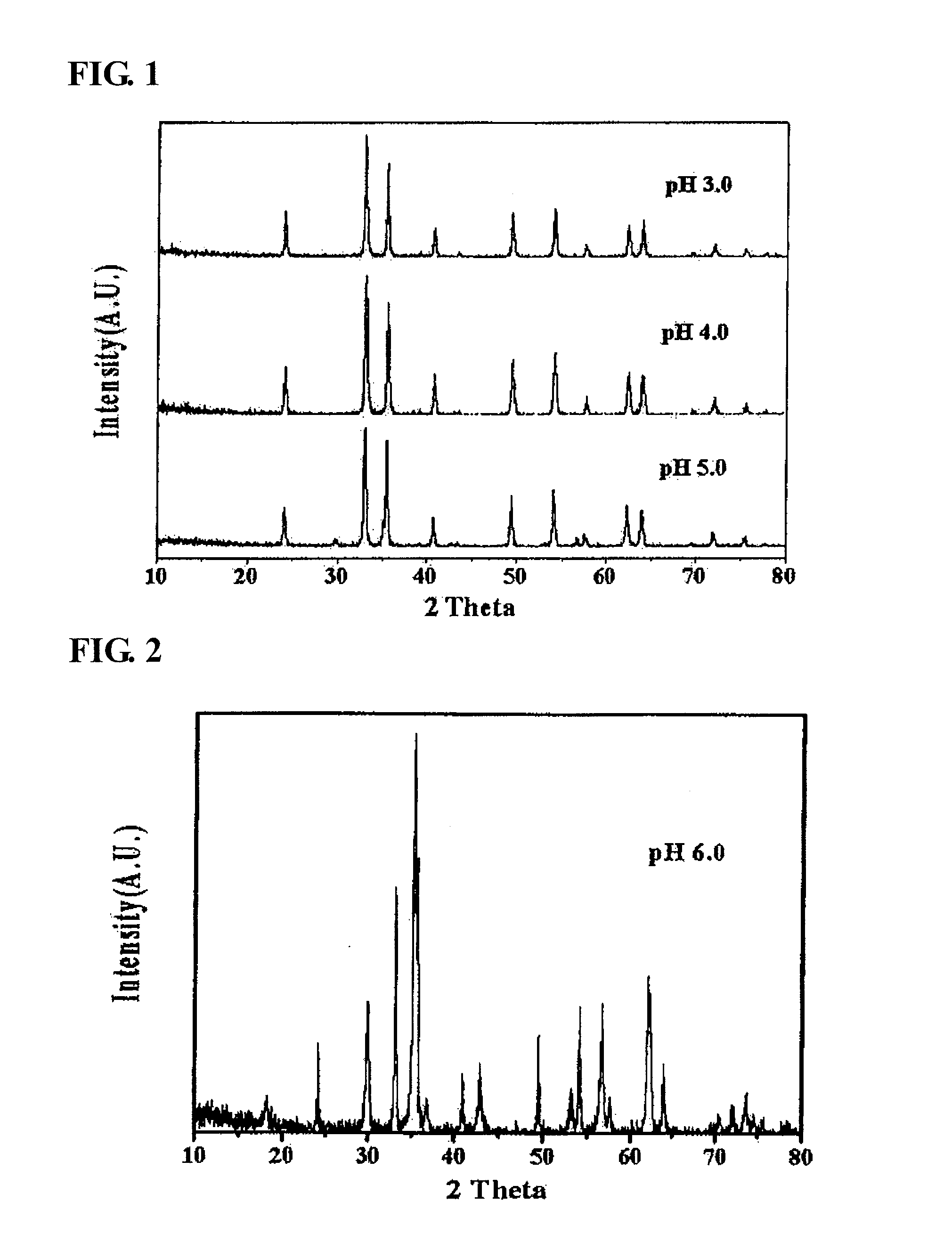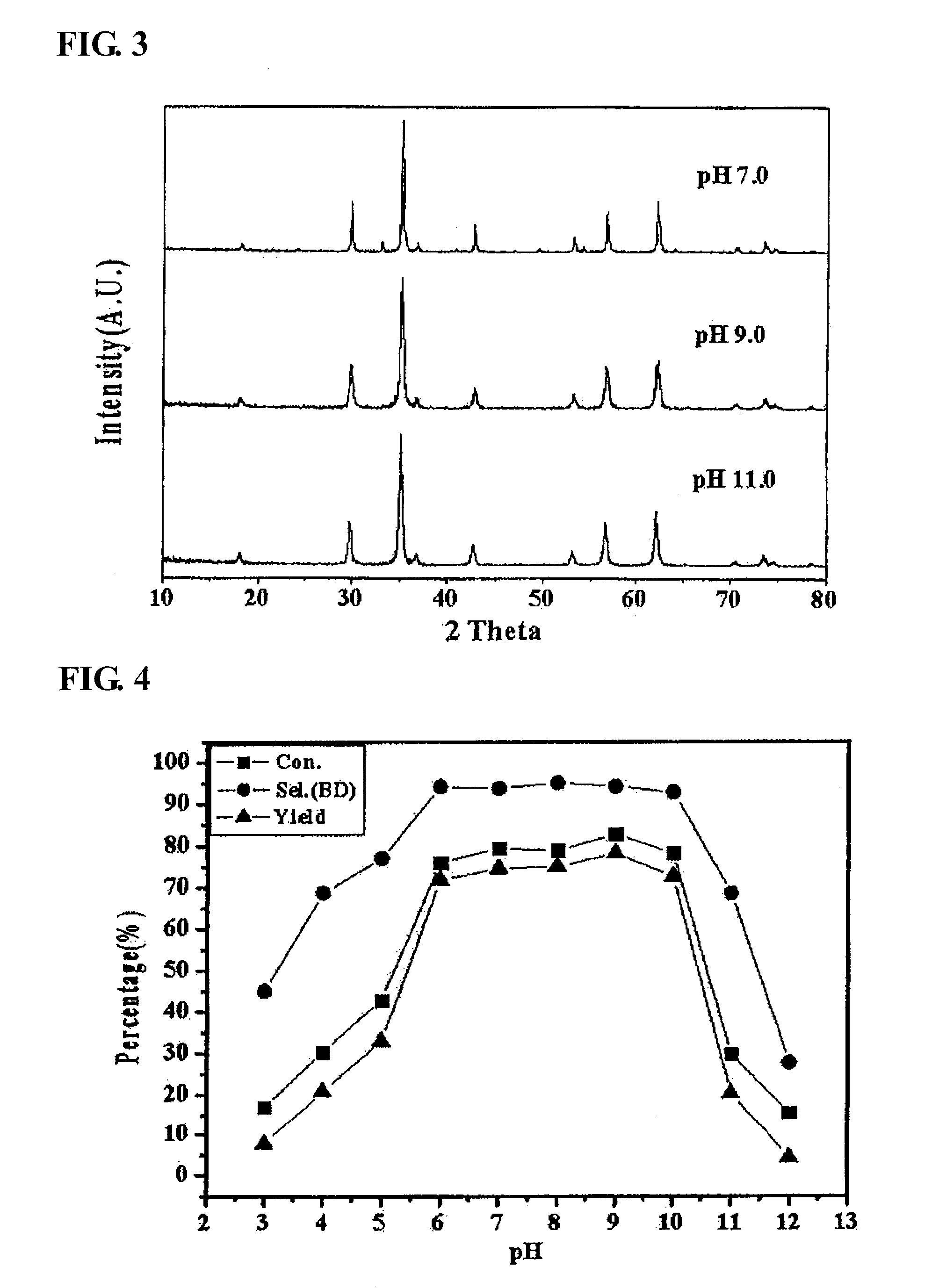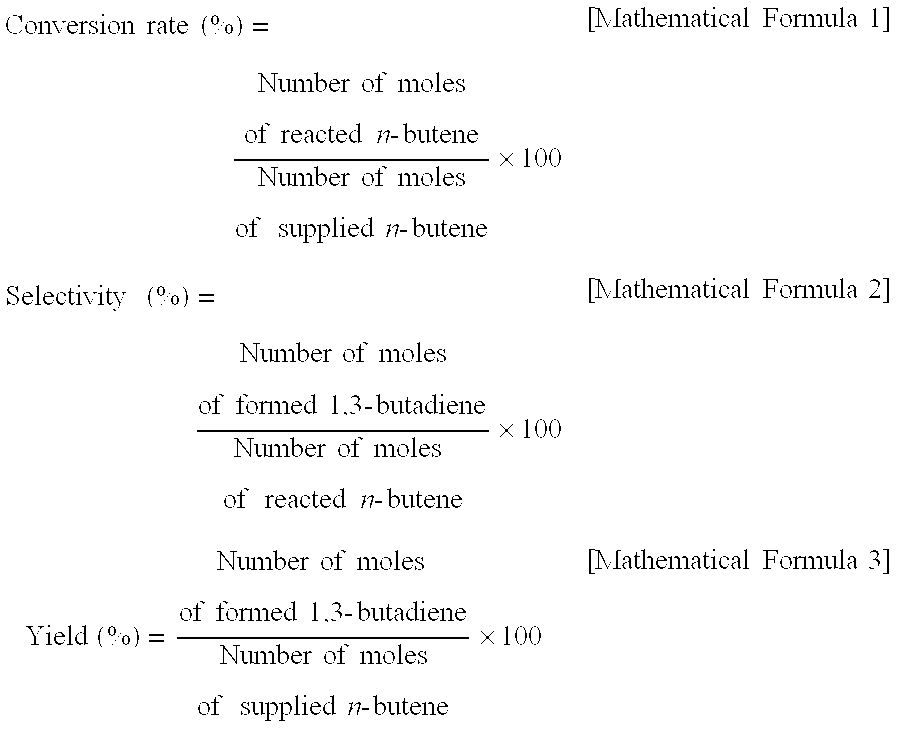Zinc ferrite catalysts, method of preparing thereof and method of preparing 1,3-butadiene using thereof
a technology of ferrite catalyst and zinc ferrite, which is applied in the direction of hydrocarbon preparation catalyst, metal/metal-oxide/metal-hydroxide catalyst, physical/chemical process catalyst, etc., can solve the problems of high yield, unsuitable for commercial processes, and excessive production of other basic fractions, and achieves high activity, high reproducibility, and simple structure and synthesis procedure
- Summary
- Abstract
- Description
- Claims
- Application Information
AI Technical Summary
Benefits of technology
Problems solved by technology
Method used
Image
Examples
example 1
Oxidative Dehydrogenation Reaction of C4-Raffinate-3 Mixture or C4 Mixture on Zinc Ferrite Catalyst
[0047]The oxidative dehydrogenation reaction of n-butene was conducted using the zinc ferrite catalyst produced in Preparation Example 1 under the following experimental conditions.
[0048]In the present invention, a C4 mixture was used as a reactant in the oxidative dehydrogenation reaction of n-butene, and the composition thereof is shown in Table 1. The C4 mixture, which is a reactant, was introduced into a reactor in the form of mixed gas together with air and steam, and a linear Pyrex fixed-bed reactor was used as the reactor.
[0049]The composition ratio of the reactant was set based on the amount of n-butene in the C4 mixture, and was set such that the mixing ratio of n-butene:air:steam was 1:3.75:15. Steam, which was formed by vaporizing liquid-phase water, was mixed with other reactants, such as the C4 mixture and air, and then introduced into the reactor. The amount of the C4 mix...
experimental example 1
Activity of α-Iron Oxide (α-Fe2O3) Catalyst
[0051]As the result of X-ray diffraction analysis, among the catalysts produced in Preparation Example 1, in the catalyst coprecipitated at a pH of 3, 4 and 5, it was found that α-iron oxide, rather than zinc ferrite, was formed (refer to FIG. 1). Three kinds of the α-iron oxide phase catalysts were applied to the oxidative dehydrogenation of a C4 mixture as in Example 1, and the results thereof are shown in Table 2. As reported in many documents, α-iron oxide had low activity in the oxidative dehydrogenation of n-butene in the present invention, and as the result of conducting an oxidative dehydrogenation reaction using the α-iron oxide, it can be seen that the conversion rate of n-butene was 17.0˜42.8%, the selectivity for 1,3-butadiene was 45˜77.0%, and the yield of 1,3-butadiene was 7.7˜32.9%, and thus it was found that the activity of the α-iron oxide catalyst in an oxidative dehydrogenation reaction is very low.
TABLE 2Activity of an α...
experimental example 2
Activity of Mixed-Phase Catalyst of Zinc Ferrite and α-Iron Oxide (α-Fe2O3)
[0052]As the result of observing the phase of the catalyst coprecipitated at a pH of 6 using the same method as in Preparation Example 1 through X-ray diffraction analysis, it was found that a mixed-phase of zinc ferrite and α-iron oxide was formed (refer to FIG. 2). The oxidative dehydrogenation of a C4 mixture was conducted using the catalyst coprecipitated at a pH of 6 as in Example 1, and the results thereof are shown in Table 3.
[0053]In a catalytic activity test conducted using the mixed-phase catalyst prepared at a pH of 6, it was found that the conversion rate of n-butene was 76.1%, the selectivity for 1,3-butadiene was 94.1%, and the yield of 1,3-butadiene was 71.8%, and thus it can be seen that the activity of the mixed-phase catalyst of zinc ferrite and α-iron oxide in an oxidative dehydrogenation reaction was excellent.
TABLE 3Activity of mixed-phase catalyst of zinc ferriteand α-iron oxide (α-Fe2O3...
PUM
| Property | Measurement | Unit |
|---|---|---|
| Temperature | aaaaa | aaaaa |
| Temperature | aaaaa | aaaaa |
| Temperature | aaaaa | aaaaa |
Abstract
Description
Claims
Application Information
 Login to View More
Login to View More - R&D
- Intellectual Property
- Life Sciences
- Materials
- Tech Scout
- Unparalleled Data Quality
- Higher Quality Content
- 60% Fewer Hallucinations
Browse by: Latest US Patents, China's latest patents, Technical Efficacy Thesaurus, Application Domain, Technology Topic, Popular Technical Reports.
© 2025 PatSnap. All rights reserved.Legal|Privacy policy|Modern Slavery Act Transparency Statement|Sitemap|About US| Contact US: help@patsnap.com



